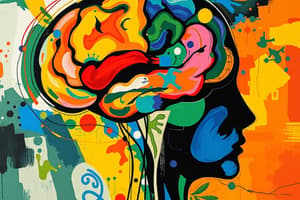Podcast
Questions and Answers
What is the primary goal of psychology that involves observing behaviors to answer questions about them?
What is the primary goal of psychology that involves observing behaviors to answer questions about them?
Which goal of psychology aims to understand the reasons behind observed behaviors?
Which goal of psychology aims to understand the reasons behind observed behaviors?
In the context of psychology, what does prediction involve?
In the context of psychology, what does prediction involve?
Which goal of psychology aims to change undesirable behaviors into desirable ones?
Which goal of psychology aims to change undesirable behaviors into desirable ones?
Signup and view all the answers
When a psychologist examines the relationship between intelligence and academic performance, they are focusing on which goal?
When a psychologist examines the relationship between intelligence and academic performance, they are focusing on which goal?
Signup and view all the answers
What year is considered the beginning of psychology as an independent field of study?
What year is considered the beginning of psychology as an independent field of study?
Signup and view all the answers
Who is considered the father of modern psychology?
Who is considered the father of modern psychology?
Signup and view all the answers
What technique did Wilhelm Wundt develop for examining mental experiences?
What technique did Wilhelm Wundt develop for examining mental experiences?
Signup and view all the answers
What does the term 'schools of thought' refer to in psychology?
What does the term 'schools of thought' refer to in psychology?
Signup and view all the answers
Which early school of psychology was founded by Edward Titchener?
Which early school of psychology was founded by Edward Titchener?
Signup and view all the answers
Study Notes
General Psychology (Psyc 1011)
- Contributors:
- Koye Kassa, Bahir Dar University (Chapters 1, 5, and 6)
- Belay Tefera, Addis Ababa University (Chapters 2 and 11)
- Aemero Asmamaw, University of Gondar (Chapters 3, 4, and 7)
- Habtamu Disasa, Dilla University (Chapters 8, 9, 10)
- Revised and Edited by: Belay Tefera, Addis Ababa University
- Date: September, 2019
Table of Contents
- Module Introduction (pages 5-6)
- Chapter 1 Essence of Psychology (pages 7-9)
- Definition of Psychology and Related Concepts
- Goals of Psychology
- Historical Background and Major Perspectives in Psychology -Early Schools of Psychology (Structuralism, Functionalism, Gestalt Psychology)
- Chapter 2 Sensation and Perception (pages 22-29)
- Meanings of Sensation and Perception
- Sensory Laws (Sensory Thresholds and Sensory Adaptation)
- Perception (Selectivity of Perception, Forms of Perception, Figure-Ground Perception)
- Perceptual Constancies
- Chapter 3 Learning and Theories of Learning (pages 39-41)
- Definition, Characteristics and Principles of Learning
- Characteristics of Learning
- Principles of Learning
- Factors Influencing Learning
- Chapter 4 Memory and Forgetting (pages 56-64)
- Meaning and Processes of Memory
- Stages/Structure of Memory (Sensory Memory, Short-Term Memory, Long-Term Memory)
- Factors Affecting Memory
- Theories of Forgetting
- Chapter 5 Motivation and Emotions (pages 69-77)
- Definition and types of motivation
- Theories of motivation (Instinct, Drive-reduction, Arousal, Incentive, Cognitive, Humanistic)
- Conflict of motives and frustration
- Definition, elements and theories of emotion
- Chapter 6 Personality (pages 79-87)
- Meaning of personality
- Psychoanalytic theory (id, ego, superego)
- Trait theory (Big Five, openness, conscientiousness, extraversion, agreeableness, neuroticism)
- Humanistic theory (self-concept, self-esteem and self-actualization)
- Chapter 7 Psychological Disorders and Treatment Techniques (pages 88-98)
- Nature of psychological disorders
- The causes of psychological disorders (biological, and psychological perspectives)
- Types of psychological disorders (mood disorders, anxiety disorders, personality disorders)
- Chapter 8 Introduction to Life Skills (pages 99-105)
- Concepts, goals, and components of life skills
- Chapter 9 Intra-Personal and Interpersonal Skills (pages 106-115)
- Self-concept, self-awareness, self-esteem, and self-confidence
- Emotional intelligence, resilience, coping with stress, anger management
- Chapter 10 Academic Skills (pages 121-131)
- Time management, note-taking, study skills, test-taking, test anxiety, goal setting
- Career development
- Chapter 11 Social Skills (pages 132-148)
- Cultural diversity, gender, social inclusion, interpersonal communication, peer pressure, assertiveness, conflict resolution, teamwork, risky behaviors
- References (pages 146-148)
Studying That Suits You
Use AI to generate personalized quizzes and flashcards to suit your learning preferences.
Related Documents
Description
Test your knowledge on the primary goals of psychology, the significance of observed behaviors, and the historical milestones in the field. This quiz covers essential concepts including key figures like Wilhelm Wundt and foundational ideas in psychology. Perfect for anyone studying psychology or interested in its origins.




